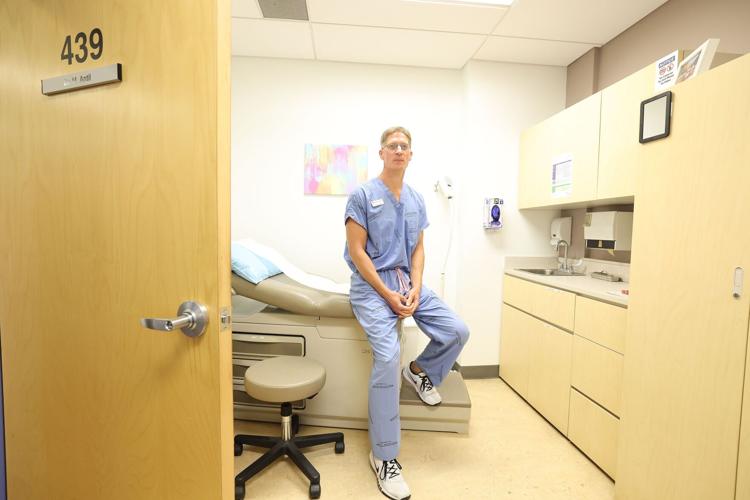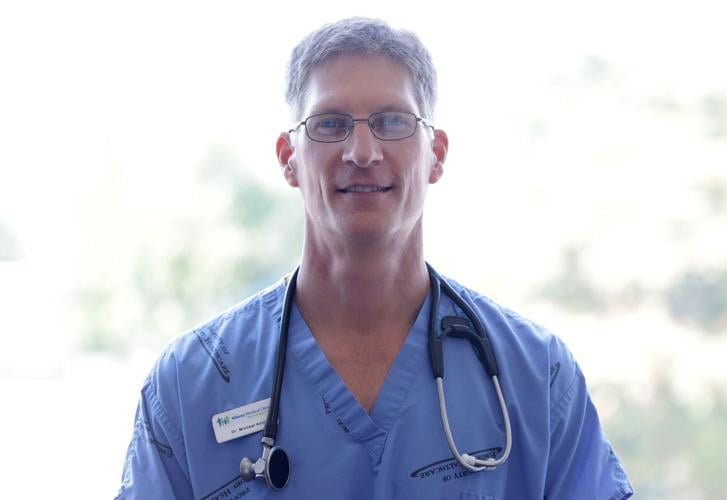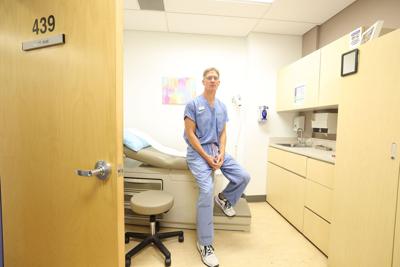American family physician Dr. Michael Antil never expected it to be this hard to get permanent residency in Canada.
The Cleveland native got his practice licence in Ontario and work permit within months. Yet after working at a şŁ˝ÇÉçÇřąŮÍřmedical clinic for more than two years, he’s struggling to meet the points threshold required to be invited for permanent residence, despite Ottawa’s effort to attract health-care professionals to immigrate to the country.
At 49, Antil’s age works against him because the immigration point system favours applicants under 45. The new rule that took effect in March, removing bonus points awarded for arranged employment, saw Antil lose another 50 points, putting him at further disadvantage.
“I feel like I’m further away from the goal than I was two years ago,” said Antil, who moved to şŁ˝ÇÉçÇřąŮÍřfrom North Carolina in July 2023 with his wife and three children, drawn by the city’s diversity and safety, as well as the opportunity to work in a universal health-care system.Ěý
“It wasn’t in writing and nobody promised me (permanent residence), but you know these are the processes you have to follow, you have your licence and you’ll get the PR because we want you and we need you. Well, here I am.”Â
While personal circumstances vary, immigration data show as of Aug. 11, there were 2,436 general practitioners and family physicians, 170 surgeons and 519 specialists in clinical and laboratory medicine in the Immigration Department’s talent pool who have not made the cut.
In June 2023, the Immigration Department introduced the “category-based selection” — better known as the “targeted draw” of skilled immigrants — to better align newcomers with Canada’s labour market needs by prioritizing candidates in specific occupational sectors.
In addition to focusing on candidates with strong proficiency in French, the system targets those in the talent pool with a background in five occupational sectors: health care and social services; science, technology, engineering and mathematics (STEM) professions; trades such as carpenters, plumbers and contractors; education; and agriculture and agri-food.
The Immigration Department said the categories are designed to increase the proportion of candidates for permanent residence with work experience in occupations that are expected to be in shortage, or with other in-demand skills to help address economic priorities. These sectors are reviewed on a regular basis to ensure they continue to support current economic objectives.
There have been 10 talent draws since 2023 targeting health-care professionals. The total of 20,850 candidates selected up to July included 2,040 family physicians, 175 specialists in surgery and 790 specialists in clinical and lab medicine. There were also dozens of other qualifying professions such as those in nursing, pharmacy, dentistry and veterinary medicine.
Roughly two million people in Ontario alone lack a family doctor.
Immigration lawyer Ilene Solomon said both Ottawa and provinces have made accommodations to facilitate the immigration and licensing of foreign-trained doctors, such as awarding them points for Canadian work experience, which aren’t available to other self-employed candidates.
However, it hurt the prospects for someone like Antil when the federal government in March removed the bonus points — 50 for those in skilled occupations and 200 for senior executives — for everyone with arranged employment in the pool.
The change was supposed to affect applicants with arranged employment equally, but Solomon said Ottawa then also reduced the permanent resident quota by 20 per cent to 395,000 in 2025. That intensified competition for the spots. As a result, the cut-off scores have remained high, and out of reach for Antil.
Right now, with all his attributes such as language, education achievements and job experience counted — as well as his wife’s master’s degree and work experience in public health — Antil has accumulated 435 points. That’s still 35 points short of the 470 required in the latest round on Aug. 19.
“We are taking important steps to reduce fraud while continuing to attract the skilled talent our economy needs,” then immigration minister Marc Miller said about the change meant to crack down on applicants purchasing fake job offers for a better shot at permanent residence.Ěý

When Dr. Michael Antil started planning this journey in 2022, some Canadian doctors he cold-called told him it would be a “slam dunk” to get permanent residence.Ěý
Steve Russell/şŁ˝ÇÉçÇřąŮÍřStarSolomon said Antil can start taking French classes now to boost his score, as immigration candidates fluent in French are eligible for 50 extra points.Ěý
“Clearly, age is prejudicial to him,” said Soloman, who represents Antil. “Honestly, his only realistic option right now is to learn French but should we really be making family doctors from the U.S. be learning French while practising in Ontario in English?”
Physicians are now lumped in the health-care talent pool with other occupations ranging from massage therapists to chiropractors, veterinarian assistants, natural healing practitioners and pharmacy supply assistants. She said not only should Ottawa reinstate arranged employment points for physicians, it should also prioritize the pool of health professionals based on the extent of labour shortages.Ěý
“Not to put those jobs down,” said Solomon. “I could call and make a massage appointment for tomorrow right now if I wanted to.”
Antil said the patients under his care at his şŁ˝ÇÉçÇřąŮÍřclinic on Broadview Avenue have grown to 2,000 from 800, and he believes he has a lot more to offer to Canada.Ěý
When he started planning this journey in 2022, some Canadian doctors he cold-called told him it would be a “slam dunk” for him to get permanent residence. In fact, an immigration lawyer he consulted said his application was so strong that he could prepare it on his own.
To be fair, Antil said he did get selected to apply for permanent residence in one draw late last year before his 50 points for arranged employment were taken away. However, the application was returned in January because he said he made a couple of mistakes in the forms — including checking the wrong box of having a doctoral degree when his was only a professional degree. He was unable to appeal the decision.Ěý
Antil said he’s now confused and frustrated, not knowing if he made the right move to Canada.
Both he and his wife have worked in Canada, and the family is considered non-resident in the U.S. As a result, his oldest daughter, now in her first year in university, could only go to school as an international student in either country. With his son going to college in a year, Antil doesn’t know if it’s going to be financially viable for the family to stay here without permanent status.
“Professionally I feel very fulfilled and I’m very happy that I moved my career here,” he said. “I would love to finish out my career here. I should have another good 25 years to work.”
































To join the conversation set a first and last name in your user profile.
Sign in or register for free to join the Conversation